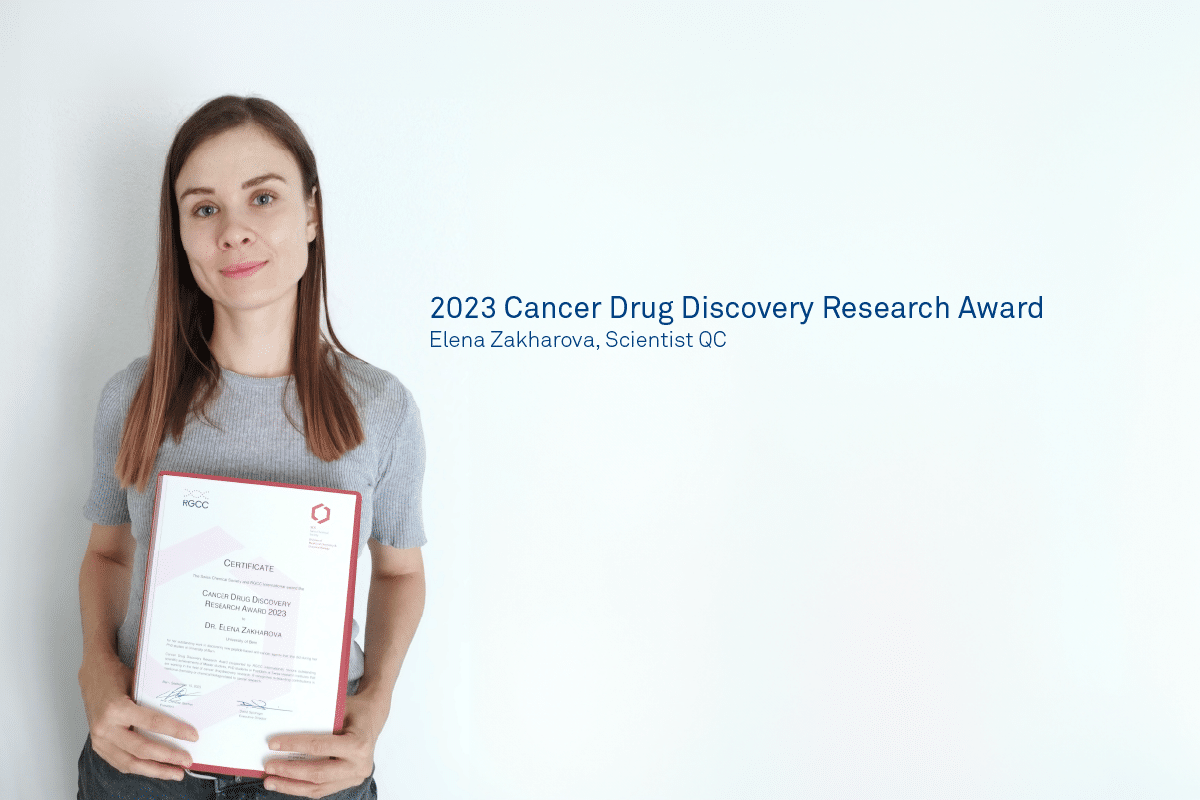Elena joined Bachem in January 2023 as Scientist QC, Early Phase. Her daily work mainly involves the development of HPLC methods for peptide-based APIs. Elena enjoys her work as it requires creativity and offers a lot of learning potential. She is also grateful for the opportunity to work with talented and passionate colleagues.
Last year, she received her PhD in Chemistry and Molecular Sciences from the University of Bern. Her doctoral research was on peptide-based anticancer agents and was awarded the 2023 Cancer Drug Discovery Research Prize from the Swiss Chemical Society.

The Cancer Drug Discovery Research Award (supported by RGCC International) rewards outstanding scientific achievements by Master’s students, PhD students, or postdocs at Swiss research institutes working in cancer drug discovery. It recognizes exceptional contributions in medicinal chemistry or chemical biology to cancer research. The prize is awarded every two years.

On the weekends, Elena enjoys various outdoor activities. With its many opportunities to discover new things, Switzerland is the perfect place for her. She enjoys hiking in the summer and skiing in the winter, but recently, she has also tried cycling, via ferrata and ski touring. During her holidays, she loves to travel and explore new countries.
We recently sat down with Elena to learn more about what motivated her to embark on the research project for which she won the award and where she sees the potential in her area of research.
What was the background or context of your research project? Can you tell us more about your research during your PhD?
Our group at the University of Bern specialized in different peptide modalities, including peptide dendrimers, with various applications. The group’s recent research efforts have focused on developing antimicrobial peptides. My PhD projects were in the direction of anticancer peptides. During my doctoral work, I designed, synthesized, and evaluated the biological activity of peptides. One of the most exciting projects was the “machine learning (ML) guided discovery of anticancer peptides.”
What sparked your interest in this research area?
I have always been fascinated by peptides – how easy these molecules are to synthesize and how potent their bioactivity can be. Starting from a seemingly limited number of amino acids, the combination of just a few of them results in an enormous chemical space. Understanding why a particular peptide has specific properties and how to identify such structure-property relationships was always intriguing.
How does your research project fit your personal and professional goals?
The full potential of peptides has not yet been exploited. Having been involved in their synthesis during my bachelor’s and master’s studies and in the evaluation of their biological activities during my PhD., I now want to master the industrial aspects of peptide production and quality control at Bachem to make them more accessible to society.
“My research has always involved peptides to some extent. Bachem is a big player in the TIDES industry. I had known Bachem since my studies as a reliable supplier of peptides/amino acids and as a company with high quality standards. There was no doubt that I would apply for a job at Bachem after graduation. There was just one question – which department? Apart from the synthetic and biological background, I wanted to try out a different role and focused on “Analytical Development” in QC as a new challenge and perspective for my career. That’s how I ended up in the QC Early Phase at Bachem.”
Is there any future work or projects planned related to your research?
I hope these projects will continue in my former PhD group and lead to more promising results. For example, combining ML (machine learning) as a predictive tool with synthetic efforts in the lab provides a natural feedback loop where peptides with enhanced biological activity (anticancer, antimicrobial, etc) can be easily identified and validated from a large chemical space.
Where do you see more potential in this area?
There is a lot of potential. Peptides can be developed into highly selective and specific drugs that act on a wide range of biological targets. In a broader context, there is the potential to address regulatory issues in complex biological systems. To achieve this, peptides or combinations thereof can play a critical role because of their synthetic availability and diversity, allowing fine-tuning the balance in such complex systems.
Are there any recent technological advances or developments that could open up new avenues for research in this field?
Machine learning-based prediction of new drugs, including bioactive peptides, is undoubtedly one of the most cutting-edge research topics and has developed rapidly in recent years. This field will likely develop even further with the continuous increase in computing power.
What are the most pressing challenges or unresolved issues facing researchers in this area?
Regarding peptide drug development, the challenges still revolve around reduced protease stability and bioavailability. Also the limited understanding of the exact mechanism of action.
In which direction would you like to develop in the future?
As a “fresh” PhD graduate who has just joined Bachem, I would like to gain more experience at the company as the work and the team are fantastic. I am passionate about biotechnology, and would like to further develop my know-how in this field in the future.
Our people & culture
Or about our people & culture, one of our strategic foundations?
Click here >>
Subscribe to our newsletter
"*" indicates required fields
Careers at Bachem
Click here >>
